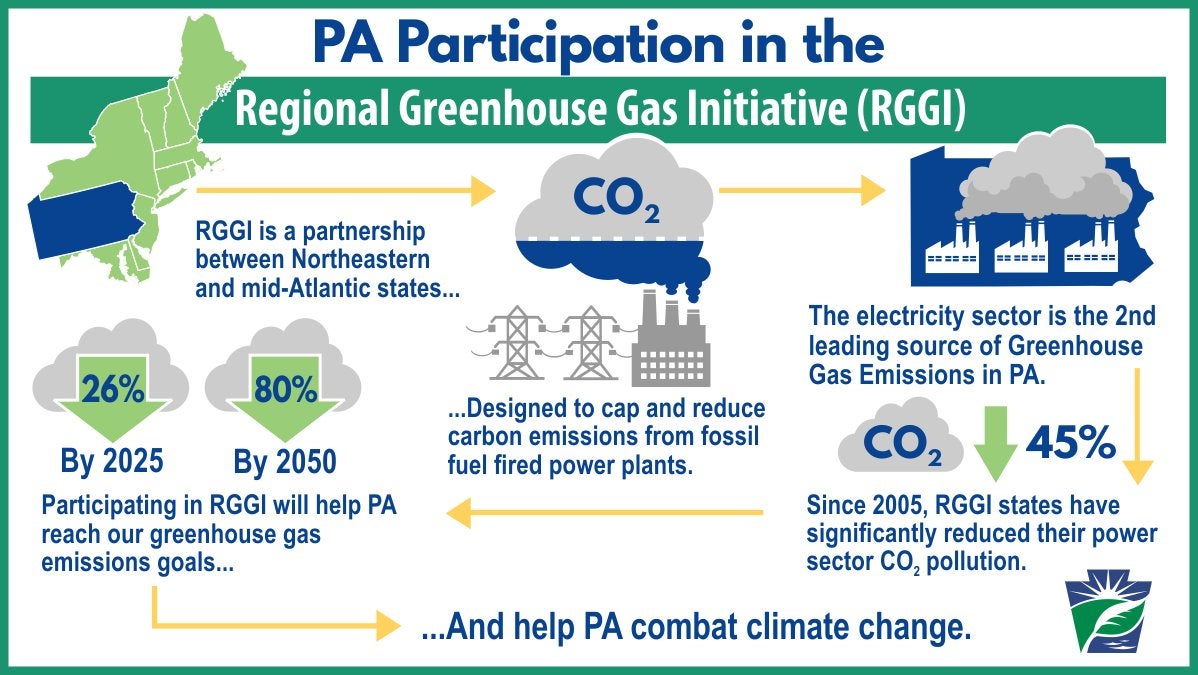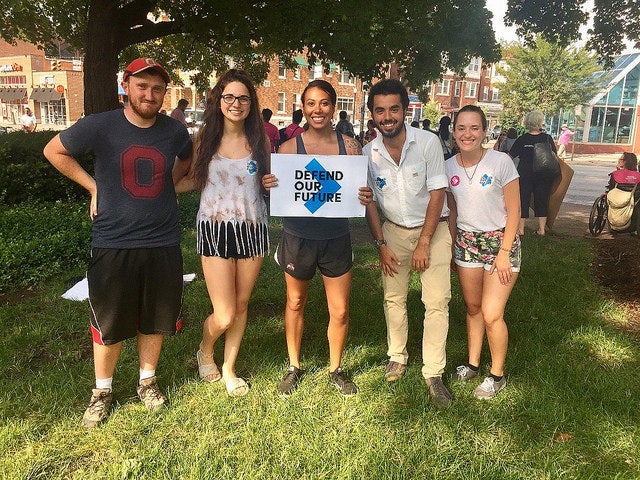In early December, Defend Our Future Pennsylvania students and community leaders testified at the virtual hearing hosted by the Pennsylvania Environmental Quality Board (EQB). The EQB sought public comments from Pennsylvanians as well as out-of-state stakeholders on whether the Commonwealth should take part in the Regional Greenhouse Gas Initiative, an interstate compact of 11 states mandating the reduction of power sector emissions. The comment period concludes on January 14, 2021. You may submit your comment here.

Defend Our Future campus ambassadors shared their testimony with us below.
Anya Tewari, Temple University student and Defend Our Future campus ambassador
Good afternoon, my name is Anya Tewari and I am speaking today on behalf of myself as a private citizen. I currently live in Philadelphia, but I still visit my family in India as often as I can. I have seen first hand how climate change is already starting to take effect in those areas, by changing weather patterns, causing more extreme monsoons and floods which destroy crops and people’s homes. It is very apparent that we are having a climate crisis right now, and need to take immediate action to combat and mitigate the effects however we can.
I am here today to give testimony on the Regional Greenhouse Gas Initiative ruling. I believe that Pennsylvania should participate in RGGI for the good of the climate and its citizens. Joining RGGI is key to Pennsylvania lowering pollution, fighting climate change, and providing a better quality of life for Pennsylvanians today. Multiple analyses have shown that this state has the fifth dirtiest power sector in the nation, and that joining RGGI would provide benefits such as tackling emissions, generating economic growth, saving consumers money, and improving public health.
First of all, Joining RGGI would ensure a 25% carbon pollution reduction from 2022-2030 in Pennsylvania’s power sector. Without RGGI, Pennsylvania’s carbon emissions are projected to increase by the middle of this decade. Immediate action is critical to help the state achieve its greenhouse gas emissions targets.
Economically speaking, participation in RGGI will result in an increase of jobs in Pennsylvania and add $1.9 billion to the Gross State Product. According to reports released by the Wolf administration in August 2020, the energy sector provided 269,031 jobs, or 4.5 percent of the overall statewide workforce, as of the last quarter of 2019. The clean energy sector showed an average job growth rate of 8.7 percent, or nearly double that, adding 7,794 jobs in 2017-2019. Market forces suggest that natural gas will continue to replace coal as a low-cost energy source into the next decade. RGGI can help make sure that we continue to reduce emissions while increasing the creation of clean-energy jobs. RGGI can lead to an expansion of the state’s 90,000+ clean energy jobs(2019 data), which have grown to outnumber those in the fossil fuel industry, and position the state as a leader in the clean energy economy.
Aside from job creation, it would also save consumers money. Current data from states already participating in the program suggest that the average residential electricity bill in RGGI states will be 35% lower in 2031 than it was in 2017.This would place PA on a path to having a cleaner and healthier economy.
Additionally, participation in RGGI could generate massive health benefits for Pennsylvanians. As pollution from power plants has gone down, residents in the Northeast are now experiencing significantly fewer premature deaths, heart attacks and respiratory illnesses.
I hope these facts prove to you that Pennsylvania would see numerous benefits from participating in the Regional Greenhouse Gas Initiative, and should do so
immediately. From my own experience, I can tell you that climate change is real, and we are seeing the effects of this crisis right now. RGGI is a flexible and proven cap-and-invest program that would allow the state to reduce carbon emissions from the power sector in a simple, cost-effective way. There is no reason we should oppose a program that would only reduce emissions, stimulate the economy, create jobs, and benefit the health of PA’s citizens. Again, I believe it is in the best interest of everyone that the DEP move deliberately and quickly on the RGGI rule in the interest of real and meaningful climate action.
Vanessa Nelson, Temple University and Defend Our Future campus ambassador
 Good afternoon. My name is Vanessa Nelson, I am originally from the Harrisburg area and now live in Philadelphia as a student at Temple University. I am here on behalf of Defend Our Future, a non-partisan climate activism organization sponsored by the Environmental Defense Fund, which engages young people to act on the climate crisis. As a young person and a student, I realize that my generation will encounter significant challenges as a result of the climate crisis, including rising global temperatures, unhealthy air, and environmental racism. I, along with many of my peers, struggle with anxiety thinking about the dim future we will have to live in if the climate crisis is not acted upon swiftly. That being said, I would like to voice my support today for Pennsylvania joining the Regional Greenhouse Gas Initiative which will support healthier air and water for Pennsylvanians and incentivize a move towards clean energy.
Good afternoon. My name is Vanessa Nelson, I am originally from the Harrisburg area and now live in Philadelphia as a student at Temple University. I am here on behalf of Defend Our Future, a non-partisan climate activism organization sponsored by the Environmental Defense Fund, which engages young people to act on the climate crisis. As a young person and a student, I realize that my generation will encounter significant challenges as a result of the climate crisis, including rising global temperatures, unhealthy air, and environmental racism. I, along with many of my peers, struggle with anxiety thinking about the dim future we will have to live in if the climate crisis is not acted upon swiftly. That being said, I would like to voice my support today for Pennsylvania joining the Regional Greenhouse Gas Initiative which will support healthier air and water for Pennsylvanians and incentivize a move towards clean energy.
Pennsylvania is currently the second largest greenhouse gas producer in the nation, the third largest coal producer in the nation, and the fourth largest carbon dioxide emitter in the nation. It’s clear from these statistics that something must be done deliberately and quickly in Pennsylvania to curb greenhouse gas emissions in the interest of real and meaningful climate action. Even so, the energy sector currently employs about 4.5% of Pennsylvanians, and a plan to move towards cutting emissions must also invest in clean energy jobs for those currently working for fossil fuel companies. The nature of RGGI, in that it is a cap-and-trade program, allows for significant investment to be put back into the energy sector in the form of creating opportunities for clean energy jobs and doing justice in transitioning workers into the clean energy sector. So far, it has been observed that states participating in RGGI have returned over 2 billion dollars in proceeds. Maryland has used its more than 500 million dollars in proceeds to invest in energy efficiency upgrades for low-to moderate-income households, improving energy efficiency for small businesses and more, as a way to drive energy costs even lower. Maryland serves as a perfect example of how RGGI can be implemented while still protecting low-income communities from having to pay higher prices for energy.
Reducing emissions would also lead to numerous health benefits for Pennsylvanians. Certain areas of Pennsylvania have some of the worst air quality in the entire nation, which exacerbates dangerous health conditions, such as asthma and other respiratory illnesses as well as heart attacks, and can lead to premature deaths. Notably, these unwanted health effects most often fall on low-income communities and particularly communities of color. It is unjust that a lot of the communities that provide labor for fossil fuel companies also have to bear the brunt of the pollution given off by said companies in the form of negative health effects.
As a biology student, I’ve had the opportunity to study the health of streams in the area surrounding Philadelphia firsthand. Only the most resistant insects were capable of surviving in them, due to how polluted they were. And I’m sure that this is the case in many other PA metropolitan areas. RGGI is crucial in limiting greenhouse gas emissions and therefore, driving PA to invest in clean energy solutions to reduce overall pollution in PA.
I am proud to see such overwhelming bipartisan support of emissions reduction legislation like RGGI. Pennsylvanians realize how important it is to maintain the beauty of our state and defend communities that are particularly disenfranchised by harmful emissions. We acknowledge that action must be taken immediately to reduce greenhouse gas emissions. RGGI is a proven, market-based solution being implemented in blue, red, and swing states. Absent a better proposed approach for Pennsylvania, legislators would be well served to act on the wishes of a vast majority of Pennsylvanians who want their leaders to act on climate.




